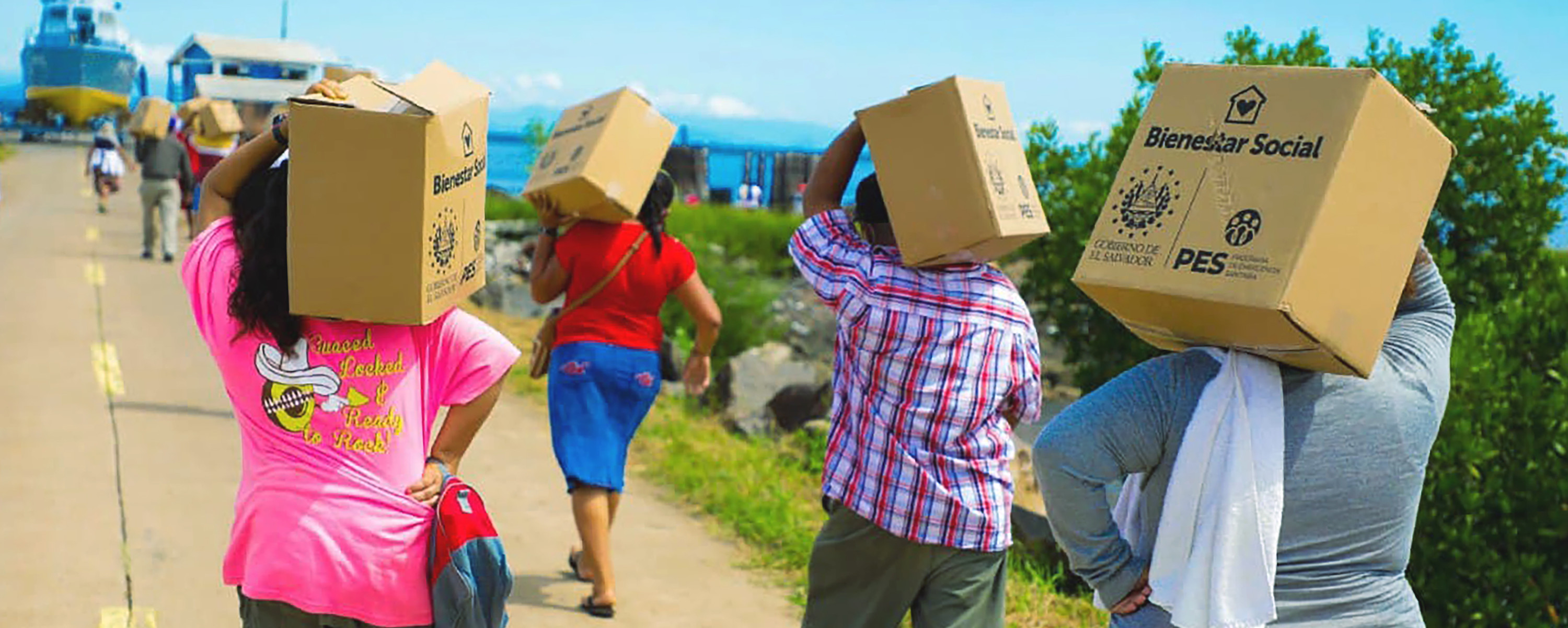In the chaotic first week of the Covid pandemic, El Salvador paid an offshore company $27 million USD to provide milk powder for its hungry citizens — but the shell firm overcharged and under-delivered, pocketing $7 million, a government audit found.
The 2021 audit —which probed the entire food distribution program, involving several firms and products— revealed little about the company tapped to deliver milk powder.
Now, reporting by El Faro and OCCRP has shed light on the opaque company.
Aroum Group Inc. is registered in the British Virgin Islands, where regulations provide corporate anonymity. But the company’s website reveals the identity of one person involved with the firm.
The man who set up Aroum Group’s website was a Venezuelan named Wiomar Castillo, who described himself on LinkedIn as the firm’s “international trade manager.”
Castillo’s role, if any, in securing the contract for Aroum Group is unclear. He is from the same Venezuelan city as Tomás Hernández, an advisor to El Salvador’s president, but it is not known if they are personally acquainted.
However, Hernández and Castillo’s daughter have been interacting on social media for more than a decade. In a photo she posted to her charity’s Instagram account, for example, Hernández wears a T-shirt with the organization’s logo, while he has posted messages on both her personal and philanthropic accounts.
Hernández is reportedly part of a clique of Venezuelans close to El Salvador’s authoritarian president, Nayib Bukele. One of Hernández’ jobs was to oversee the pandemic food emergency response, and he would have likely played a key role in handing the lucrative powdered milk contract to Aroum Group.
Neither Castillo nor Hernández responded to requests for comment.
Ross Delston, an American lawyer and anti-money laundering expert, said the powdered milk deal violated basic principles of due diligence, which should be carried out as a measure against corruption.
“Due diligence is an alien term when it comes to state contracts that are given to people who are known by and close to senior government officials,” he said.
The fact that El Salvador contracted a company registered in the BVI also raises suspicions, Delston added.
“It would be difficult to imagine how the government could reasonably understand who they were doing business with,” he said.
The president’s office did not respond to an emailed request for comment, and did not answer a phone call.
Although it was registered in the BVI, Aroum Group’s customs declarations listed its address at a business tower in Panama City. Edevisa, the law firm that shares the address, told El Faro the company has never been a client of theirs.
Overseas Management Company Trust, another law firm that handled Aroum Group’s corporate registration, declined to comment, citing internal confidentiality policies.
The nationalities of Castillo and Hernández were not the only links reporters found between El Salvador and Venezuela, where a similar scheme saw state funds stolen via overvalued contracts for food, prompting U.S. sanctions in 2019.
Mexican financial authorities investigated a company called Ilas Mexico S.A. de C.V. in connection to the Venezuela scheme, although the outcome of the probe was never made public. That same Mexican company supplied Aroum Group with the milk powder for El Salvador.
Despite Mexico and El Salvador being closer geographically and sharing land transport routes, Aroum Group sent its shipment through Panama, where it had set up a bank account to receive the government paycheck.
When El Salvador’s government audited the purchase, it found that Aroum Group had overvalued the $27-million-contract by $5.3 million. In addition to pocketing that money, Aroum Group appears to have made another $1.7 million by failing to deliver the entire amount of milk powder it had promised.
Castillo has since erased the LinkedIn profile where he publicized his role at Aroum Group, while the company has changed its name on paper to SM Intertrade Inc.
Pandemic corruption
El Faro investigations have shown that pandemic-related government contracting was a hotbed for corruption shielded from public view. For months in 2020, after obtaining permission in March from the Legislative Assembly to bypass contracting protocols in order to expedite purchases, the Bukele administration refused to submit detailed spending reports to legislative auditors.
In May 2020, the Attorney General’s Office opened an investigation into $22.7 million in Covid-19 food purchases made by the Ministry of Agriculture and Livestock (MAG) after finding evidence of favoritism and overcharging in contracts granted to the government’s largest supplier.
Six months later, by November, two-thirds of spending on emergency medical supplies across multiple state agencies were under investigation for insider dealing or other irregularities.
Prosecutors also found evidence that Vice Minister of Security Osiris Luna embezzled $1.6 million in emergency food bundles and, with the help of his mother, resold them to an accused contraband smuggler.
The following year, on May 1, 2021, the day that the ruling party Nuevas Ideas took two-thirds control of the Legislative Assembly, legislators illegally removed Attorney General Raúl Melara from office. They replaced him with Bukele loyalist Rodolfo Delgado, who dissolved the team of prosecutors in charge of these cases and shuttered the investigations.
Four days later, on May 5 of that year, the Assembly passed legislation granting public officials immunity from civil and criminal suits related to pandemic spending.
Top officials have faced international consequences for evidence of corruption. In 2022 the U.S. State Department revoked the visas of Luna and Agriculture Minister Pablo Anliker. In 2021, the Treasury sanctioned Bukele’s chief of cabinet Carolina Recinos for allegedly orchestrating “a multi-ministry, multi-million dollar corruption scheme” involving inflated or suspicious pandemic contracts.
*Jonny Wrate is an investigative reporter from the Organized Crime and Corruption Reporting Project (OCCRP) based in Mexico. A version of this article was originally published in English by OCCRP in partnership with El Faro.

